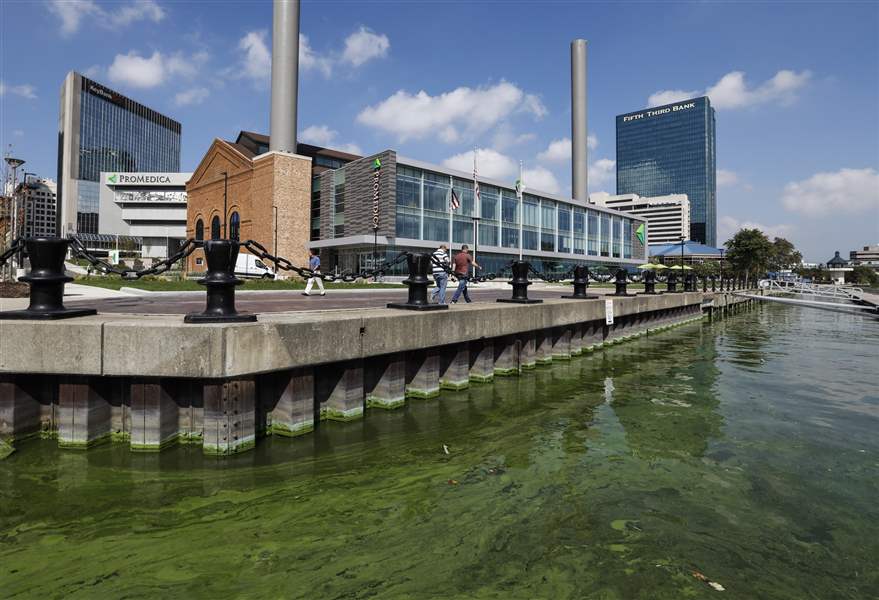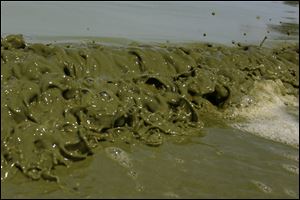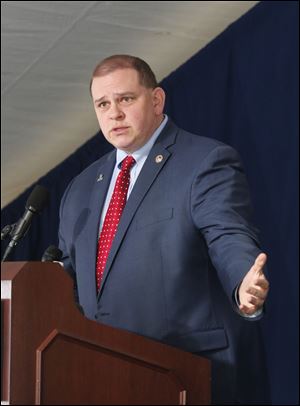
Kapszukiewicz goes after Farm Bureau, legislature at algae conference
5/2/2018
Algae in front of the new ProMedica Headquarters in downtown Toledo, Wednesday, September 20, 2017.
The Blade/Andy Morrison
Buy This Image
ANN ARBOR — The second and final day of an algae conference here attended by many Great Lakes scientists and policy experts began with Toledo Mayor Wade Kapszukiewicz decrying the agricultural lobby’s influence on state legislators.
“We live in a state where our legislature is a wholly owned subsidiary of the farm bureau,” Mayor Kapszukiewicz said. “I'm sorry, but it's true.”
He went on to say he believes that enforcement against algae-inducing runoff from northwest Ohio farms inside the western Lake Erie watershed has thus far amounted to strongly worded letters and bureaucratic hand-slapping. That “is just not going to be good enough,” he said.
RELATED CONTENT: U.S. Rep. Dingell says she tried to sway Kasich to move faster on Lake Erie's impairment
The mayor said he’s bothered progress at reducing farm runoff has been minimal despite billions of state and federal dollars spent on farm incentives. Customers of the Collins Park Water Treatment Plant, by contrast, have spent about $1 billion over the last 30 years in upgrading the plant and have shouldered most of that burden, he said.

Thick algae floats in Lake Erie Thursday, August 7, 2014, at Maumee Bay State Park in Oregon.
Nearly half of that spending has been since the 2014 Toledo water crisis and, according to the mayor’s calculations, Toledo has received only $8 million under the federal Great Lakes Restoration Initiative for improvements to its water and sewage treatment plants.
He noted how the region’s concentrated animal feeding operations, or CAFOs, produce the manure equivalent of human waste generated by the cities of Chicago and Los Angeles combined.
“In some ways, were you to impose sinister motives to them [big agriculture], they've pulled off quite a ruse,” Mr. Kapszukiewicz said. “They get away with it all of the time.”
He said Ohio Environmental Protection Agency Director Craig Butler recently suggested during a meeting in the mayor’s office that the city hold a news conference to shed light on slightly improved numbers showing the city’s Bayview sewage treatment plant is further reducing phosphorus released.
Mr. Kapszukiewicz said he didn’t do that because it would “falsely create the perception that we are equal partners in the problem.”
The Ohio EPA is declining comment on that, agency spokesman Heidi Griesmer said.
An Ohio EPA report issued earlier this month shows 88 percent of the Maumee River’s phosphorus and 89 percent of its nitrogen come from farms and other nonpoint sources.
“We are going to stand together and be clear about who's causing this problem,” Mr. Kapszukiewicz said.
He later said this about state legislators: “I believe they are loath to impose restrictions on individuals who form the base of their voting bloc. That may be tough, but that's what I believe.”

Mayor Wade Kapszukiewicz
Joe Cornely, the Ohio Farm Bureau Federation’s senior director of corporate communications, said the mayor seemed willing to work with farm bureau representatives when they met with him in his office just a few weeks ago.
“It's disappointing the mayor took a different approach publicly,” Mr. Cornely said. “As for our influence at the statehouse, this is how democracy works. Our members are proud of their grassroots engagement, including working with the legislature to support two recent bills that require farming practices to protect the lake.”
A year ago this month — on the day before Mr. Kapszukiewicz announced his candidacy for mayor — he joined activist Mike Ferner and about 20 other people on an extensive, all-day tour of southeast Michigan CAFOs.
He told The Blade then there were two things he would do right away for Lake Erie if elected mayor.
One would be calling for an impairment designation, something former Mayor Paula Hicks-Hudson refused to do until having a change of heart after seeing a strong bloom up close in downtown Toledo last September.
The other was having Toledo join the Chicago-based Environmental Law & Policy Center and Mr. Ferner’s group, Advocates for a Clean Lake Erie, in their federal lawsuit against the U.S. EPA and the Ohio EPA over the lack of an impairment designation at the time.
The Kasich administration, under pressure from that lawsuit, ultimately changed course and agreed to make the impairment designation in March. But U.S. District Judge James Carr of Toledo has maintained jurisdiction to ensure there’s follow-through.
Mr. Kapszukiewicz told The Blade after his presentation in Ann Arbor he is now having the city’s legal department look into the possibility of having the city join the ELPC and ACLE in that lawsuit.
The ELPC was one of two organizers of the algae conference, along with the Cooperative Institute for Great Lakes Research the National Oceanic and Atmospheric Administration has on the University of Michigan campus.
Rick Stumpf, a NOAA oceanographer who heads algal bloom forecasts for the Great Lakes, said a new satellite launched on April 25 and another planned for launch in 2019 will generate razor-sharp images deep below Lake Erie’s surface. He said they will instantly become among the region’s most sophisticated, high-tech, and important research tools.
“This is exciting,” Mr. Stumpf said, adding that improvements in aircraft and drone surveillance also are coming. “This is the future.”
Lana Pollack, one of three U.S. commissioners on the U.S.-Canada International Joint Commission — a State Department-level agency that helps the two countries resolve boundary water issues — said people need to get past “demonizing” farmers.
But she also said agriculture needs to stop expecting breaks, such as privacy over which farms engage in best management practices and which don’t.
“Democracy depends on transparency. Without accountability, volunteerism is sure to fail,” she said. “Without any visibility, without any peer pressure, this isn’t going to work. The farmers want to keep it private. But the lake’s not private.”
Earlier during her session, Ms. Pollack said it’s “not about demonizing farmers.”
“It's about demonizing pollution,” she said. “It’s not a hostility to farmers. It's a commitment to the lakes and the health of the ecosystem. No sector of the economy is so great it is allowed to do what it is doing right now. I'll be damned if I let the value of farming destroy our lifestyle.”
Contact Tom Henry at thenry@theblade.com, 419-724-6079, or via Twitter @ecowriterohio.